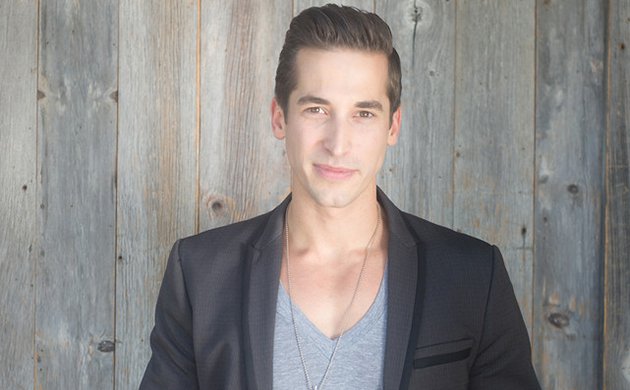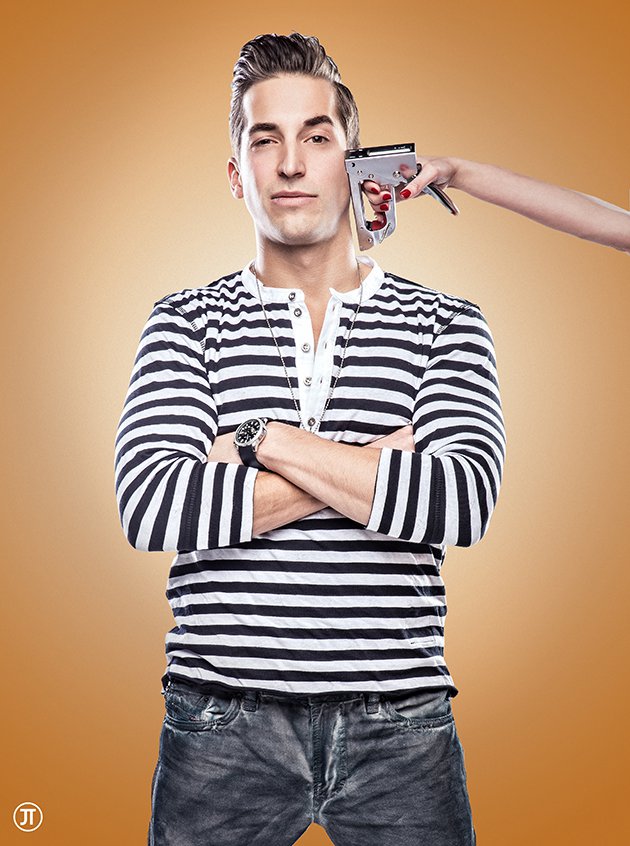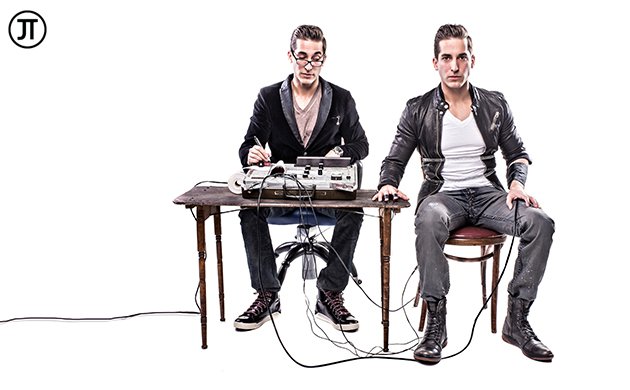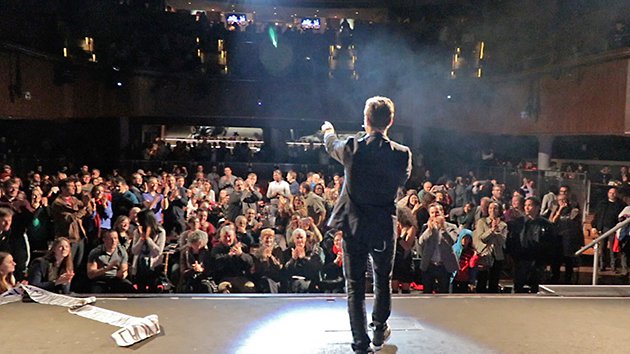×
Think back to when you were a kid, what did you want to be growing up? A professional athlete? President of the United States? A Firefighter? For Max Major, that decision was a no brainer ... magician.
brbr“There are multiple moments throughout my life that reaffirm I’m doing the right thing,” Max admits. “It always felt right.”
brbrWith the support of his family and friends, Max went from a 10-year-old magician with a big dream to a 32-year-old mentalist and three-time recipient of Washington City Paper’s Reader’s Poll “Performance Artist of the Year” award. Each one of Max’s shows incorporate magic, psychology, hypnosis, and the powers of the human mind that will make you, “THINK AGAIN”.
brbrMax will be performing at the Baltimore Theatre Project on August 12th & August 13th, September 2nd & September 3rd during his tour, THINK AGAIN. Don’t miss the chance for an unforgettable experience! You can purchase your tickets here.
“People should come see the show because its modern, its smart, its interactive, its inspiring and it wont be like any magic show you’ve seen before!” – Max Major

brbrI think every kid learns a magic trick and a dirty joke; it’s like a right of passage. As a kid growing up, for whatever reason it really spoke to me. I was lucky enough to have my calling in life be a thing that every kid is exposed to. Luckily, my life’s work is a thing that every kid stumbles into. I really listened to that. My parents are really supportive. They’re the kind of parents that said go do that not go get a real job or you need to think about your future. They never said anything like that. I was lucky to have parents that didn’t squash my dreams because a lot of people do.br
brWhen I turned 18 my dad got hypnotized so he could quite smoking and that was probably a big turning point because that was real magic. He left the house, someone said some words to him, he came home, and he never smoked again after 20 years. I thought that was maybe something I should look into, because that’s a real superpower.
brbrI started studying hypnosis, psychology and body language, and that sort of led me down the path to become a mentalist. Mentalism is a marriage of magic, body language, psychology, science, and hypnoses and its where I’m at now.
brbrWhat makes me me, is me. It’s my personality, it’s my life experience, it’s the stories I tell when I’m on stage, it’s the specific approach I have to it. It’s not in contrast to anyone else, its just the last 20 years of my life make me unique.
brbrSome performers are bothered by that because they’re not working, but its kind of why you’re doing what you’re doing, its natural someone’s going to say “show me something” because how often do you meet someone with that skill set.

brbrOn one hand the show is completely different every night because you’re dealing with different people and different answers and different ideas. But, I also have to respond with what’s happening in real time and that’s what keeps it fun, exciting, and fresh. There are things that go wrong every night but as a performer you keep moving, like any great show.
brbrThe next step is play. Experimenting. Part of it is trying things on your friends, phone calls, and brainstorming with other performers. It’s a very collaborative art. It looks very solo, but it’s actually an entire community.
brbrThen you take it from theory into practice. Into practice really means on stage. There’s no middle ground. I can have this theory, be pretty sure its going to work, take my experience and be 90 percent sure, but at some point I have to take it to a stage with a real crowd. There’s a human factor, but I have to try it. Sometimes things work and sometimes they don’t.
brbrYou slide it into your show in between two things that you know will work. Testing new material, you’ve got this thing you’ve been doing for five years and this thing you’ve been doing for three years and put this brand new thing right in between.

brbrI also have this bizarre fascination with really large scale construction. I don’t know what that means. Maybe in another life I was a construction worker or something, but I’m so fascinated by buildings going up and cranes. I’m never going to do anything with it, I’m fully aware of that, but for some reason theirs a weird thing there.

brbrLook for help, ask for advice. For the longest time I was afraid to ask for help or support or advice. But at the same time don’t listen to anyone else. Trust your own instincts but when you need help, don’t be afraid to ask for it.
brbr“There are multiple moments throughout my life that reaffirm I’m doing the right thing,” Max admits. “It always felt right.”
brbrWith the support of his family and friends, Max went from a 10-year-old magician with a big dream to a 32-year-old mentalist and three-time recipient of Washington City Paper’s Reader’s Poll “Performance Artist of the Year” award. Each one of Max’s shows incorporate magic, psychology, hypnosis, and the powers of the human mind that will make you, “THINK AGAIN”.
brbrMax will be performing at the Baltimore Theatre Project on August 12th & August 13th, September 2nd & September 3rd during his tour, THINK AGAIN. Don’t miss the chance for an unforgettable experience! You can purchase your tickets here.
“People should come see the show because its modern, its smart, its interactive, its inspiring and it wont be like any magic show you’ve seen before!” – Max Major
Most magicians start at a young age, can you describe your first encounter with magic and how it managed to capture your attention?
brbrI started performing when I was 10 or 11 years old. I was performing at every family party, every chance I got, and its been over 20 years now.brbrI think every kid learns a magic trick and a dirty joke; it’s like a right of passage. As a kid growing up, for whatever reason it really spoke to me. I was lucky enough to have my calling in life be a thing that every kid is exposed to. Luckily, my life’s work is a thing that every kid stumbles into. I really listened to that. My parents are really supportive. They’re the kind of parents that said go do that not go get a real job or you need to think about your future. They never said anything like that. I was lucky to have parents that didn’t squash my dreams because a lot of people do.br
brWhen I turned 18 my dad got hypnotized so he could quite smoking and that was probably a big turning point because that was real magic. He left the house, someone said some words to him, he came home, and he never smoked again after 20 years. I thought that was maybe something I should look into, because that’s a real superpower.
brbrI started studying hypnosis, psychology and body language, and that sort of led me down the path to become a mentalist. Mentalism is a marriage of magic, body language, psychology, science, and hypnoses and its where I’m at now.
What makes you different from the other mentalist/hypnosis/magicians out there?
brbrI don’t believe in competition, in general or in any field. You do what you do to the best of your ability and there’s a market for that. I don’t think people are deciding between you and someone else. I think you perform to the best of your abilities and there's an audience for that.brbrWhat makes me me, is me. It’s my personality, it’s my life experience, it’s the stories I tell when I’m on stage, it’s the specific approach I have to it. It’s not in contrast to anyone else, its just the last 20 years of my life make me unique.
It’s not everyday that you get the opportunity to meet a mentalist, what’s the first thing people ask once they find out about your profession? Do you ever give impromptu performances?
brbrThey say, “Oh what’s that, are you psychic, I’m mental too,” Once people figure out and understand what it is, they ask to show them something or if I can you read their mind. It comes up all the time. If you have a job that has such unique demonstratable skill, it’s like you have to show them something.brbrSome performers are bothered by that because they’re not working, but its kind of why you’re doing what you’re doing, its natural someone’s going to say “show me something” because how often do you meet someone with that skill set.
Do you ever feel like you’ll be wrong?
brbrThat’s what makes it fun. Every night that I’m on stage I don’t know what’s going to happen, I don’t know who I’m going to meet, who’s going to come on stage, what they’re going to say, what they’re going to think, and that’s what makes it fun.brbrOn one hand the show is completely different every night because you’re dealing with different people and different answers and different ideas. But, I also have to respond with what’s happening in real time and that’s what keeps it fun, exciting, and fresh. There are things that go wrong every night but as a performer you keep moving, like any great show.
What is the easiest part/hardest part of performing?
brbrThat 90 minutes that I’m on stage is the most alive I feel in my entire life. Walking on stage is the easy part and waking off stage is the hard part, because that means I have to stop. There’s no outside noise when your onstage, theirs no fleeting thought, its like a pure float state, my mines not wondering to what I have to do the next day, its 100 percent in the moment. There’s nothing I can do to control that, I just walk out on stage and it just happens. It’s a really cool feeling. You walk off stage and life starts again.How do you practice?
brbrI read a lot, that’s the core of it. Articles online, old studies, old texts, body language, influence, psychology, optical illusions. It starts with looking and then you experiment. Looking can be like trolling the internet, but with a purpose.brbrThe next step is play. Experimenting. Part of it is trying things on your friends, phone calls, and brainstorming with other performers. It’s a very collaborative art. It looks very solo, but it’s actually an entire community.
brbrThen you take it from theory into practice. Into practice really means on stage. There’s no middle ground. I can have this theory, be pretty sure its going to work, take my experience and be 90 percent sure, but at some point I have to take it to a stage with a real crowd. There’s a human factor, but I have to try it. Sometimes things work and sometimes they don’t.
brbrYou slide it into your show in between two things that you know will work. Testing new material, you’ve got this thing you’ve been doing for five years and this thing you’ve been doing for three years and put this brand new thing right in between.
What is the most rewarding part of performing?
brbrProbably the conversations that happen in the lobby after the show. After every show, I go out to the lobby and I stand there until every person that wants to say hi has left. I do that every night because I love it and because of the conversations that start as a result of seeing the show, the questions people ask, the way they are inspired, the light bulbs that go off in their head, lot of the young kids that I get to meet that’s really cool because they’re so inspired.If you weren’t a mentalist, what would you do?
brbrI’ve always thought I could be a college professor. For some reason, I would love to teach business in a college setting. There’s an aspect to what I’m doing now, when I’m speaking or performing theirs an underlying message there.brbrI also have this bizarre fascination with really large scale construction. I don’t know what that means. Maybe in another life I was a construction worker or something, but I’m so fascinated by buildings going up and cranes. I’m never going to do anything with it, I’m fully aware of that, but for some reason theirs a weird thing there.
Most embarrassing moment while performing?
brbrI’ve always tried to get laughs my whole life, so if something embarrassing were to happen, that’d be a bonus. I have a frequent habit of performing with my fly down the whole show and it keeps happening. I check neurotically and it keeps happening. Maybe once or twice someone will tell me but most of the time no one tells me and I’m just oblivious to it.What is your favorite act to perform?
brbrI do this thing, without giving too much away, in the show with peoples jobs. I think it’s my favorite part of the show because so much of our identity is derived by our work whether that’s intentional or not. Whether you’re living your dream, doing something on the side, or learned to love your work, I’m really passionate about my work and work in general. I think its one of the most important things we do with our life, so why would you do something that makes you anything less than happy? So there’s a whole thing in the show where I work with some people and try to guess what they do for a living and that’s probably my favorite part of the show because of the message that’s there, but its kind of fun to learn what people do, sometimes you get some strange ones.What advice would you give to someone who was just starting out?
brbrGo for it. People give themselves all the reasons to wait and so my advice would be to get to work. You can never have the right plan in anything that you’re doing, but it’s important to have a plan. Any plan is good enough. What you’ll find is everything changes once you get started. The hardest part and the easiest part is just getting started.brbrLook for help, ask for advice. For the longest time I was afraid to ask for help or support or advice. But at the same time don’t listen to anyone else. Trust your own instincts but when you need help, don’t be afraid to ask for it.